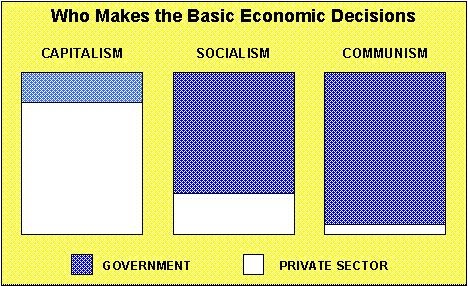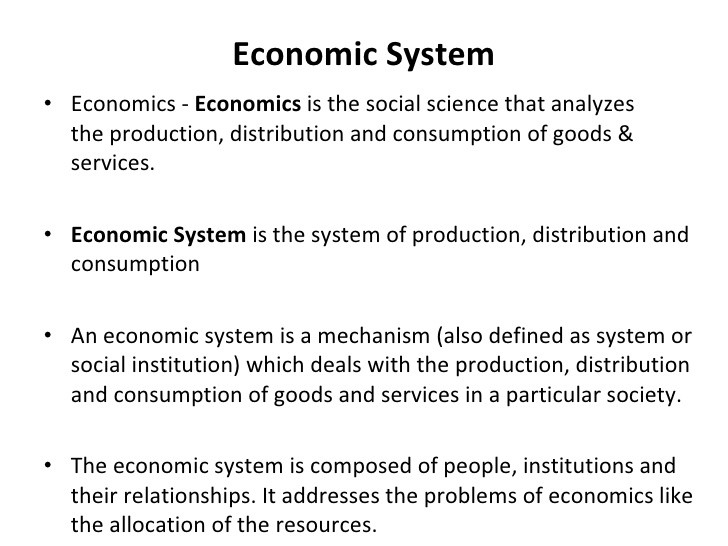Economic Systems Capitalism Communism and Socialism
Post on: 16 Март, 2015 No Comment

An economic system consists of the institutions and the method by which resources are allocated and products and services are distributed. Economic systems differ primarily in who owns the factors of production. how the allocation of resources is directed and the method used to direct economic activity. The primary distinction between the different systems is the degree to which the government participates in the economy.
Communism
Communism. also known as a command system. is an economic system where the government owns most of the factors of production and decides the allocation of resources and what products and services will be provided.
The most important originators of communist doctrine were Karl Marx and Frederick Engels. Like the socialists before them, they wanted to end the exploitation of the masses by the few. The capitalist system at that time required workers to work under harsh and dangerous conditions for little pay. The end goal of communism was to eliminate class distinctions among people, where everyone shared equally in the proceeds of society, when government would no longer be needed.
Karl Marx agreed with Louis Blanc in how labor and income should be managed: From each according to his abilities, to each according to his needs. However, it seems clear from history that Adam Smith had the correct principle, which is that people work in their own self-interest.
Marx and Engels believed that there was a class struggle between the masses, which Marx referred to as the proletariat. who could only offer their labor, and the owners of the means of production, which included land, raw materials, tools and machines, and especially money. Karl Marx called these members of the ruling class the bourgeoisie. He believed that a political revolution was essential because the state was a central instrument of capitalist society, and since the bourgeoisie had a stranglehold on the government, it would, in many cases, be necessary to use force and violence to overthrow the capitalists.
Although Marx and Engels believed that property should belong to society, they did not really give much thought to how economic decisions would be made. Communist countries, particularly Russia and China, decided on a centrally planned economy (aka command economy ). The centrally planned economy had the following major attributes:
- The government owns all means of production, which is managed by employees of the state.
- These employees operated under party-appointed economic planners, who set output targets in prices and frequently interfered with the operations to satisfy personal or party desires.
- And because communist economies are not efficient and because of the Communist Party’s desire to retain power, most economic resources were devoted to industrialization and to the military, depriving consumers of food and other necessary products, causing intense competition for these limited necessities, where many people had to wait in long lines for common consumer goods, such as toilet paper.
Another major feature of communist economies was their emphasis on the country’s self-reliance, discouraging international trade and investment.
Major decisions were made by the highest-ranking members of the Communist Party, which, in the Soviet Union, was called the Politburo. The Politburo frequently met with the Central Committee that consisted of the heads of the local Communist Party factions and government ministries, the military, police, and other major participants in the economy.
Although the purpose of communism was to serve the needs of the proletariat, communist governments simply became repressive regimes that exploited their people to aggrandize their own power, exploiting the masses even more so than the capitalists.
Capitalism
As long ago as 1776, the Scottish philosopher Adam Smith set down many of the main principles of capitalism in his now classic book An Inquiry into the Nature and Causes of the Wealth of Nations .
Under capitalism (aka market system ), each individual or business works in its own interest and maximizes its own profit based on its decisions. A market economy is one where the allocation of resources and the trading of goods and services are through the decentralized decisions of many firms and households. Prices and the willingness of the market to pay those prices determines economic output, which, in turn, determines the allocation of resources.
The market system fosters competition that generally produces the most efficient allocation of resources. In pure capitalism. also known as laissez-faire capitalism. the government’s role is restricted to providing and enforcing the rules of law by which the economy operates, but it does not interfere with the market. (Laissez-faire means let it be.)
The essential characteristics of capitalism are that:
- the factors of production are privately owned;
- economic transactions take place in markets, where buyers and sellers interact;
- businesses and employees are free to pursue their own self-interest;

Because consumers are free to buy what they want, the competition for their funds will require businesses to satisfy their needs, or else they will cease to exist due to lack of sales. This consumer sovereignty is what effects the efficient allocation of resources.
The main purpose of the government in regard to the economy is to promote free markets, keep inflation low and steady, protect the rights of private property, and to guarantee contracts.
Socialism
The definition of socialism varies widely, but it can accurately be described as an economic system between communism and capitalism. Like communism, socialism seeks to redistribute the wealth more equitably by the communal ownership of natural resources and major industries, such as banking and public utilities. Socialists also seek to nationalize monopolies, which greatly enrich their owners at the expense of the proletariat. However, unlike communism, most small or nonessential enterprises would remain privately owned. Also unlike the Communists, most socialists do not advocate violence or force to achieve their economic system.
Economic Systems of the Future
History has amply demonstrated that communism and socialism retard the growth of economies, because there is no competition between businesses, and the people who manage such businesses are often political appointees, chosen more for their social connections them for their understanding of the businesses that they manage. Furthermore, large industries are often under the control of many bureaucrats, who often issue conflicting demands. They care little about whether society wants their product or service, and do not care as much about costs, since they are covered by the government.
Moreover, communism and socialism give great power to a few individuals who then become obsessed with retaining their power, even at the tremendous expense of society. For instance, Cuba and North Korea are almost completely communistic, and even though the Communist governments in both countries have controlled their countries for years, their people remain mired in abject poverty. Consequentially, the people of Cuba and North Korea are mere economic slaves who are used to enrich the communist dictators of these countries.
The other major problem with communism and socialism is that not only are the major leaders almost completely ignorant of economics or the needs or wants of their people, but it is very difficult to remove them, in spite of their detriment to the economy. Even when a communist, such as Hugo Chávez in Venezuela, is elected in a democratic election, his primary goal is to retain his own power, even as the economy crumbles around him.
Capitalism works best because it promotes competition so that only the most efficient businesses survive. Survival requires that the business owners are knowledgeable about their business and can manage it effectively, that they can minimize costs to produce their product or service, and that they know what people want. Otherwise, the business will fail, as most do.
Thus, capitalism provides the best means of achieving the efficient allocation of the factors of production and providing society with the goods and services that it most desires at the lowest possible cost. Hence, the production possibility frontier is maximized, providing the greatest benefit to society with the available scarce resources.
Although capitalism is the most effective means of allocating resources, it does have serious shortcomings, including the following:
- monopolies that can interfere with free enterprise and reduce allocation efficiency through their pricing power;
- free markets that do not price in externalities . which is the effect that the production of a good or service has on people that is not related to the good or service itself, such as the creation of pollution in producing a product.
A capitalist economy also requires a government to enact and enforce laws, to promote economic stability through monetary policy. to provide services that cannot be provided by a market system, such as a military to protect society against foreign invaders, and to redistribute some of the wealth to poorer people, especially by providing social security programs, such as health care, which is unaffordable for many people.
The redistribution of some wealth is necessary, because even in a capitalist economy, some people gain tremendous wealth, then use it to influence governments to make them even wealthier, usually at the expense of poor people. For instance, in the United States, working income is taxed at a higher rate than either investment income or inherited income, income that accrues mostly to the wealthy. Although there is a progressive, marginal income tax rate in the United States, the tax is almost a flat tax when payroll taxes are added, and since payroll taxes do not apply to either investment income or inherited income, most wealthy people pay a far lesser percentage of their entire income than poorer people, which is one of the reasons why the top 1% is accumulating an ever greater portion of America’s wealth.
No doubt that the science of economics will guide the development of future economies, fine tuning them by promoting what works and eliminating what doesn’t work.














